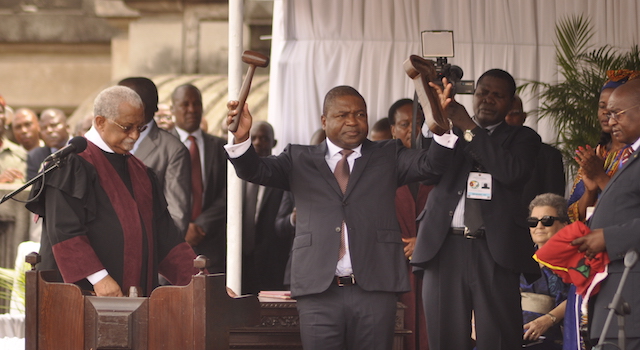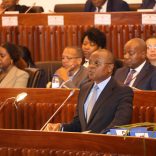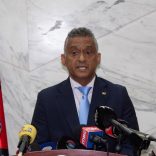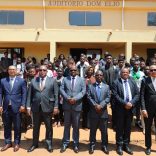Mozambique: Central bank governor attends inauguration of Metical Square in Quelimane
Mozambican economy “suspended” until Filipe Nyusi takes office – A Verdade

FILE: For illustration purposes only. [File photo: A Verdade]
The Bank of Mozambique (BM) “has decided to keep the monetary policy interest rate” unchanged, by aligning itself with the entrepreneurs, bankers and investors who are waiting for economic activity to resume after Filipe Nyusi takes office for a second term as President of the Republic. The MIMO rate has been at 12.75 percent since August, and the central bank argues for it remaining the same given the “prevalence of high risks and uncertainties”, which will only be addressed when the new government reveals its Five Year Plan, Economic and Social Plan and State Budget.
Mozambique’s central bank has suspended its monetary policy easing for five months now, similar leaving at the same level its Permanent Deposit Facility and Permanent Lending Facility rates, and the Reserve Requirements ratios for domestic and foreign currency liabilities, and will only return to consider them afresh in February.
The BM has no new justification for its decisions: “Prevalence of high risks and uncertainties that, if materialised, could reverse the current low inflation profile. Internally, there is the worsening of military instability in the northern and central areas of the country and the greater likelihood of climate shocks. Externally, trade and geopolitical tension persist with negative implications for global trade volume and commodity price dynamics,” it says in a statement.
“As for economic activity, the recovery forecasts for 2020 are still below their potential. According to the INE, Gross Domestic Product continued to slow to 2.0 percent in the third quarter of 2019. However, it is expected to improve from 2020, supported by (i) post-cyclone reconstruction, (ii) State settlement of debts with suppliers of goods and services and (iii) implementation of projects related to gas exploitation,” the central bank says.
More definitive were the Mozambican entrepreneurs who had called for the swift investiture of Filipe Nyusi the day before, and the Confederation of Economic Associations president, who made it clear that the “risks and uncertainties” would cease to exist when the government’s 2020-2024 Five-Year Plan, its Economic and Social Plan and the 2020 State Budget were approved.
“We want to underline the importance of approving the main normative instruments as early as possible, so as to reduce the uncertainties which may arise from delays,” Agostinho Vuma said.
Economic recovery only after the 2020 PQG, PES and OE approval
Bankers had also signalled that risk in the economy was unchanged as a result of the Prime Rate of the financial system remaining at 18%, where it has been since October.

The fact is that the economy continues to produce little. In the third quarter, even the fisheries sector output (including aquaculture) has declined, while imports continue to rise, thus worsening even further the balance of payments deficit.
While not explicitly saying that the Bank of Mozambique has signalled that it has done everything it could at the level of monetary policy, they all yearn for any fiscal policies the future government may adopt to boost the economy, and these will only be known once the new Five-Year Plan, Economic and Social Plan and State Budget are revealed.
The Constitutional Council, although it has not yet proclaimed the winners of the 15 October general elections, has scheduled the investiture of the deputies for 13 January and that of Filipe Nyusi for his second term as President of the Republic two days later.
@Verdade has ascertained that the Five Year Plan, Economic and Social Plan and State Budget for next year are almost ready, but will have to be submitted for the approval of the Assembly of the Republic – a formality given the absolute majority obtained by Frelimo.
In 2015, the new Executive was appointed two days after the inauguration of the Head of State, but the new Five-Year Plan only left government desks in mid-February. It took almost two months to be approved by the Assembly of the Republic, which only approved the Economic and Social Plan and State Budget at the end of April that year.
By Adérito Caldeira













Leave a Reply
Be the First to Comment!
You must be logged in to post a comment.
You must be logged in to post a comment.